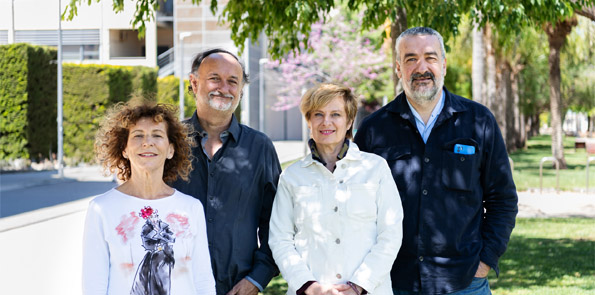Open Future Lab
UPV and UOC researchers promote the Ibero-American Network for the Futurisation of Higher Education
[ 21/05/2024 ]
For more than five years, researchers from the Universitat Politècnica de València (UPV) and the Universitat Oberta de Catalunya (UOC) have been working to develop innovative methodologies to guide and facilitate strategic changes in organisations around the world. In this context, the UPV and UOC team has just created the Open Future Lab Association, a non-profit organisation to promote the Ibero-American Network for the Futurisation of Higher Education.
This association, founded and directed by Antonia Ferrer Sapena, Enrique Sánchez Pérez, Fernanda Peset, Pedro Fernández de Córdoba (from the UPV) and Pablo Lara Navarra (from the UOC), already has its first ambassadors in different Latin American countries: Carlos Fosca (Peru), Víctor Castaño (Mexico) and Camilo Delgado (Colombia).
The Open Future Lab (https://openfuturelab.madphy-upv.com) brings together a multidisciplinary team committed to understanding the future beyond conventional forecasting, integrating sophisticated mathematical tools with the automated analysis of vast amounts of information. The initiative is harnessing the full potential of artificial intelligence to guide informed decisions in a wide range of sectors, including education, leisure, hospitality, pharmaceuticals and retail.
To this end, the Open Future Lab research team has developed methods for predicting future trends using conceptual analysis, fuzzy mathematics and machine learning techniques.
"These tools make it possible to analyse huge amounts of information available on the Internet. We aim to support decision-making in all areas of human activity. In short, it is a method that combines qualitative and quantitative analysis, based on data and textual information, which uses artificial intelligence to map out optimal strategies in dynamic and complex environments such as those faced by organisations today," emphasises Pedro Fernández de Córdoba.
Unique future dialogues
These tools for analysing future scenarios have been disseminated in recent years through the Singular Future Dialogues series of conferences. The first edition, held in Barcelona, featured Prof. Galileo Violini, an academic with a long career in science policy in Latin America, recognised with awards such as the John Wheatley, the Joseph A. Burton Forum Award of the American Physical Society and the Spirit of Abdus Salam Award.
These dialogues focused on the prospects for higher education in Latin America. The Open Future Lab has initiated futurisation projects in various regional academic institutions. In particular, there is an ongoing collaboration with the Pontifical Catholic University of Peru (PUCP), whose Graduate School is exploring futurisation opportunities using the Open Future Lab methodology. This collaboration involves co-creating future strategies with directors, managers, professors and students linked to the Andean institution.
The second edition, held in Valencia in March 2024, included a futurisation workshop for representatives of the Nayarit Innovation Centre of the Mexican State Government, which is interested in changing its economic matrix by differentiating itself from other tourism models.
Upcoming objectives
"In the coming months, our objectives are to continue with the Futurisation Project for Postgraduate and Lifelong Learning that is being developed at the Pontifical Catholic University of Peru, to extend it to other universities in the region, to consolidate the network of universities that have joined this initiative and to hold the first congress of the network. We also want to promote the project in areas other than education. To this end, we are strengthening our relationship with the government of Nayarit," concludes Antonia Ferrer.
Outstanding news
 The Diamond Army
The Diamond Army
Two students came up with the UPV initiative that has engaged more than 1,600 volunteers and shattered the false myth of the 'crystal generation'
 ARWU 2024
ARWU 2024
The Shanghai ranking reaffirms the UPV as the best polytechnic in Spain for yet another year
 Distinction of the Generalitat for Scientific Merit
Distinction of the Generalitat for Scientific Merit
Guanter has been distinguished in recognition of his research excellence in the development of satellite methods for environmental applications
 The new statutes come into force
The new statutes come into force
The Universitat Politècnica de València is the first university in Spain with statutes adapted to the new LOSU
 NanoNIR project against breast cancer
NanoNIR project against breast cancer
UPV Researcher Carla Arnau del Valle receives an EU Marie Curie grant to develop biosensors for the early detection of this cancer
 Large artificial intelligence language models, increasingly unreliable
Large artificial intelligence language models, increasingly unreliable
According to a study by the Universitat Politècnica de València, ValgrAI and the University of Cambridge, published in the journal Nature





